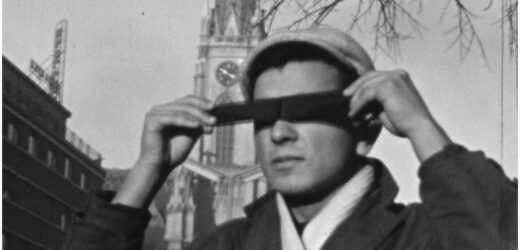“The Eclipse” by Nataša Urban has picked up the top Dox:Award at Copenhagen Intl. Documentary Film Festival.
It was awarded at a ceremony in the Danish capital, which opened with a homage to Ukraine – where fest organizers announced they would be screening Daniel Roher’s “Navalny” in theaters across the nation immediately after the festival to show “that there is another Russia.”
“The Eclipse” was competing with 11 others for the top award – half of them had their world premiere at the fest, part of no fewer than 76 world premieres during the event.
Focusing on the events of Aug. 11, 1999, when most of Serbia’s population barricaded themselves in their homes and nuclear bunkers in fear of a total solar eclipse, the film uses the rare natural phenomenon as a metaphor for a nation’s unclean conscience about the consequences of its political choices. In the process, Urban’s documentary essay confronts her country’s wartime and criminal past, and the evil that is still on the loose today.
“This film broke me down and I’m still picking myself up. It was indescribably difficult to make that film, but I will do it again,” said Urban as she received the award on behalf of herself and her team.
Handing out the award, the jury said: “The Dox:Award goes to a film that affirms a vocation for the moving image in a time of global crisis. The director dares to look in the mirror of a troubled present and reckon with the ghosts of a bloody past, arguing that historical amnesia is a burden carried across generations.
“We were stirred by the film’s rage, moved by its tender beauty, and roused by the ugliness it courageously makes its subject. As our present of war and violence threatens to one day become yesterday’s news, this film tells us in unambiguous terms: do not look away; do not forget.”
The New:Vision Award, which is dedicated to experimental and artists’ films, went to “What About China?” by film artist and theorist Trinh Minh-ha, who returns to film and photography she shot in rural China in the early 1990s in an essayistic reflection on the rich and complex history of the country.
The jury commended her film for “a timelessness fashioned not just through the structure of looking back 30 years, but through a lucidity that assumes a contemporaneity without insistence.”
Special Mention went to “Congress of Idling Persons” by Bassem Saad from Lebanon, who brings together artists, musicians and intellectuals from around the world on a performative reflection on political protest and migration.
Lena Karbe’s “Black Mambas” won the F:act Award dedicated to films spanning investigative journalism and documentary. It follows a group of women from the communities around Kruger National Park in South Africa who have formed the Black Mambas – a military-trained network that fights against poaching, in what is also a fight for women’s liberation.
The jury congratulated the filmmaker, saying: “A seemingly simple story that quietly reveals its complex layers, ‘Black Mambas’ touches upon a multitude of themes, acknowledging but also defying stereotypes. In an ideologically charged landscape we get to experience the struggles and empowerment of young women against the persisting power structures, within the frame of race, family dynamics and the tight grip of colonialism that refuses to let go.”
Alex Pritz’s “The Territory,” about indigenous activists in the Amazon who fight government-backed farmers that are eating into their territory, was awarded a special mention in the F:act category.
The Nordic:Dox Award for Nordic documentaries was picked up by Ivalo Frank for “The Last Human,” a moving tribute to Greenlandic scientist Minik Rosing’s landmark discovery of the first traces of life on Earth, described by the jury as “a singular film that dares to assemble a multitude of styles into a collage of image and thought. A film that is both a sensitive tribute to a land and opens itself up to the vast questions of life itself.”
“Tsumu – Where Do You Go With Your Dreams,” a youth film about hope, dreams and the right to be yourself in turbulent times by Kaster Kiertzner nabbed a special mention in the Nordic:Dox category.
The jury commended it as “a film that gives the power of storytelling to its protagonists: dedicated friends, teenagers with dreams who carry the weight of growing up in a place where their generation is thought to be lost. To voices from a remote society fighting to overcome the vicious circle that is laid out for them.”
CPH:DOX’s prize for emerging filmmakers and artists, Next:Wave, went to “Kash Kash – Without Feathers We Can’t Live” by Lea Najjar.
Handing over the award, the jury said, “From a tiny anecdote, this film expands its cinematic universe and unveils the disillusionment of an entire city – an entire country. From the opening scene’s claustrophobic setting, to the final wide eye of an artificial pigeon, witnessing the place it took flight from.”
‘‘Moosa Lane” by Anita Hopland received a Special Mention by the jury which described it as “a feeling rather than just a place. An in between place one can never fully contain nor grasp. We fade in and out of time through the director’s delicate yet conflicted gaze on a family history that drifts inside her memory.”
Sundance and Thessaloniki sensation “A House Made of Splinters” by Simon Lereng Wilmont, set in an orphanage in Eastern Ukraine, was awarded the Politiken Danish:Dox Award for best Danish film of the year by film critics at leading Danish newspaper Politiken. In their statement, they said: “The winner is a film that enters into the most present conflict of today’s news, but it was made by a director who traveled to Ukraine long before the rest of the world found it interesting to really bother.
“While this is not a film about the present war or even the present conflict, it brings testimony about the people who live in Ukraine, dealing with the hardships of life while the war dogs are barking in the distance.”
The Politiken jury also awarded a Special Mention to “Mr. Graversen” by Danish filmmaker Michael Graversen, where the director travels back to his childhood home where he is met by a new version of his father, which they described as “a film full of love, of mature insight and forgiveness.”
On the industry side, the festival’s financing and co-production event, CPH:Forum, handed over the Eurimages Co-Production Development Award to “The Last Nomads” by Biljana Tutorov and Petar Glomazic.
An ambitious co-production between Serbia, Montenegro, Croatia, Belgium and France, it is a tumultuous family drama that unfolds against the backdrop of land militarization in Montenegro, where the question of violence against women echoes in the violence against nature.
“It’s a very good sign [that we won] because we are coming from the outskirts of Europe and we can’t think of this film without a heavy co-production,” said Biljana Tutorov after receiving the award. “It’s also one of the most complicated projects coming out of our region, especially in the light of recent events and the problem of the militarization and the impact on the ecology.”
Co-production partners are Swiss outfit Cut Up, Croatia’s Kinematograf and French art-house production company Les Films de l’oeil Sauvage. Toronto-based Syndicado is handling sales.
“We are looking forward to getting this project out there, it’s important because Montenegro has been independent for nearly 16 years and the people of Montenegro deserve a film like this which puts their country on the map,” said Syndicado’s Aleksandar Govedarica.
Commenting on their choice, the jury, composed of Final Cut for Real’s Anne Köhncke, Vesna Cudić of Met film Sales and Albanian actor, scriptwriter and director Eduart Makri, stated: “We were impressed by this project which brings us to a place we didn’t know existed, a place of striking beauty and importance to humanity. A story of the human being in a David against Goliath battle, urgently reminding us not to lose our way in the fog of war.”
“It’s been absolutely incredible to be back in the cinemas and have everyone back in person,” the festival’s managing director, Katrine Kilgaard, told Variety. “It shows us once again that there is so much happening even without you knowing, it’s like rings in the water – you put something out there and it takes on its own life. That’s what a festival is all about.”
A selection of titles will be available on CPH:DOX’s streaming platform Doxonline.dk from April 1 through April 10.
Source: Read Full Article

